By Kathy Wray Coleman, associate publisher, editor. Coleman is a seasoned Black Cleveland journalist who trained at the Call and Post Newspaper for 17 years and an experienced investigative and political reporter. She is the most read independent journalist in Ohio per Alexa.com
CLEVELAND, Ohio – The city of Cleveland and the U.S. Department of Justice on Friday filed a joint request in federal district court seeking to incorporate voter adopted Issue 24 into the consent decree for police reforms.
Both entities, the city and the federal government, are parties to the consent decree, which was implemented in 2015 behind a series of questionable police killings of Black people since 2012 It is being monitored by Federal District Judge Solomon Oliver, a Black judge out of the Northern District of Ohio court in Cleveland who will determine whether to grant or deny the parties' joint motion to put voter approved Issue 24 in the hands of a federal district court prematurely.
Mayor Justin Bibb, whom voters elected last year to replace retiring four-term Black mayor Frank Jackson, said in a statement on Friday that incorporating Issue 24 into the consent decree is "the first step towards delivering constitutional policing and implementing the police accountability measures passed by Cleveland voters in November 2021."
But whether Judge Oliver has jurisdiction over a voter adopted police reform measure that changes the city charter simply because he oversees a consent decree between the city of Cleveland and the federal government remains to be seen. Also at issue, say sources, is the constitutionality of federal court intervention over a local ballot initiative adopted by the largely Black citizens of Cleveland, a majority Black major American city.
On the other hand, Bibb and the city's lawyers say that Issue 24 and the consent decree must operate hand and hand in order to be effective, and that police reforms outlined in Issue 24, by law, must now be included in the consent decree.
Cleveland voters passed Issue 24 last November, a police reform initiative that was on the ballot and was pushed by community activists and the Ohio ACLU, and by Tamir Rice's mother, Samaria Rice, and two other Black women who have lost loved one's at the hands of Cleveland police. Notwithstanding union agreements, it puts key decisions on police policies and the discipline of officers in the hands of a civilian-led board and commission. And like the court-monitored consent decree, Issue 24 comes after a host of police killings of Black people since 2012, including the 137 shots shooting deaths of Malissa Williams and Timothy Russell in November of 2012, and Tanisha Anderson and 12-year-old Tamir Rice in 2014.
Mayor Bibb insists that incorporating Issue 24 into the consent decree for police reforms is the best approach and has confidence that Judge Oliver, who will rule on the request in coming weeks, is likely in agreement
"Once approved, we can move forward with creating the new Community Police Commission and reforming our oversight process,” said Bibb , who has a law director in Mark Griffin, whom he appointed to replace Barbara Langhenry, the former law director with the Jackson administration and a seasoned attorney who represented the city relative to consent decree proceeding before the federal court when Jackson was mayor.
The mayor said that once the court approval comes he will move forward with creating the new Community Police Commission required by Issue 24 and appointing its members with consent of Cleveland City Council, a 17-member legislative body.
A charter amendment, Issue 24 creates a new Community Police Commission, restructures the disciplinary process for police reviews, changes the review process for police training, and removes the Civilian Police Review Board from reporting to the chief of police or public safety director.
The mayor says he wants to merge Issue 24 with the consent decree because the charter requires such, though nothing in the charter speaks of any such merger.
“In my oath of office I swore to preserve, protect, and defend the city charter," said Mayor Bibb, 34 and the city's fourth Black mayor.
Since taking office in January, Mayor Bibb has moved quickly to deliver police reforms by: 1) expanding the use of the diversion center to reduce incarceration of non-violent offenders, 2) requesting an FBI review of alleged misconduct in the anti-gang unit, 3) providing a full year budget for the new Community Police Commission, just last week, 4) moving forward with a joint amendment request to begin implementing Issue 24
Clevelandurbannews.com and Kathywraycolemanonlinenewsblog.com , the most read Black digital newspaper and Black blog in Ohio and in the Midwest. Tel: (216) 659-0473. Email: editor@clevelandurbannews.com. We interviewed former president Barack Obama one-on-one when he was campaigning for president. As to the Obama interview, CLICK HERE TO READ THE ENTIRE ARTICLE AT CLEVELAND URBAN NEWS.COM, OHIO'S LEADER IN BLACK DIGITAL NEWS.









